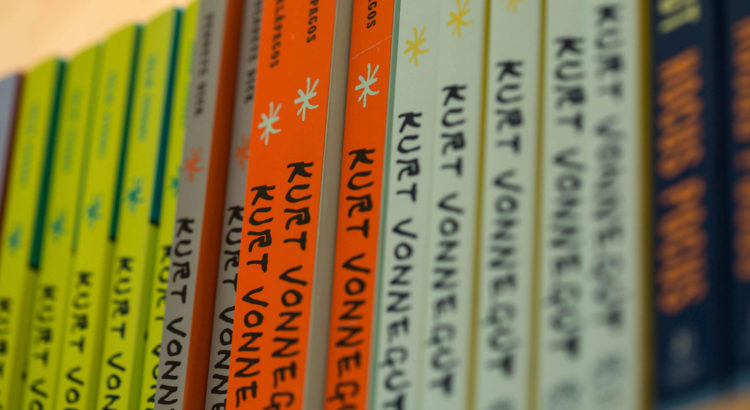If you haven’t read anything by Kurt Vonnegut, what have you been reading? That might sound bold, but if you’ve read Kurt Vonnegut, you know where I’m coming from. For me, its a combination of his dry and satirical humor and his unique way of presenting a moral that set him apart. In this context I’ll be focusing on three books: Slaughterhouse-five, Cat’s Cradle, and Mother Night, which I all wholeheartedly recommend. This is also the order in which I first read them, and approaching them linearly will hopefully help you follow my train of thought.
I first read Slaughterhouse-five my senior year of high school, outside of my English class, and I ended up finishing it in two days. For a fictional book that combined seemingly mutually exclusive topics such as war, time-travel, and aliens, I wasn’t expecting to like it. To be honest, I only picked it up because I knew it was a classic and that it was frequently referenced in literary culture. However, I was surprised by the unique writing style of Kurt Vonnegut; there is something so genuine and authentic about how he tells a story. He doesn’t seem to care so much about plot holes and accuracy, but more about the overall message of the story, and that was so different than what I was used to (considering intricate books such as The Lord of the Rings by J.R.R. Tolkien). Slaughterhouse-five was especially good at displaying how Kurt Vonnegut uses dry humor to understand humanity in the face of tragedy. A common phrase in the book is “so it goes”, in reference to everything from the end of the universe to the absurd and irrational murder of the protagonist’s companion. At first this sentiment just appears cynical, but after you finish reading you understand what Kurt Vonnegut is really trying to say: in the face of senseless human tragedy, humor is a way to cope with the truth, and to ultimately shift focus to the beautiful parts of existence.
Next I read Cat’s Cradle, and if I thought the plot of Slaughterhouse-five was bizarre, this book took it to another level. The main plot point is the existence of a dangerous material called ice-nine that turns any liquid into ice. However, the story follows a simple protagonist named John and his strange journey that eventually converges with the story of ice-nine. It also features a strange island with an outlawed religion called Bokononism, which is central to the themes of the book. Essentially it is a nihilistic and cynical religion, and Kurt Vonnegut uses it as a punching back to criticize the concept of religion as a whole. In doing so, Vonnegut expands beyond the traditions and beliefs of religion and reveals a human element in understanding life. Through his character development and use of humor, he shows how absurd humanity is, while simultaneously showing how the journey is more important than the destination. Even if everything ends in tragedy, as things often do when people are involved, the story is what teaches us how special it is to be human. This alternative perspective on life is so genuine in Kurt Vonnegut’s writing that you almost forget you were reading fiction.
Last but not least (in fact to many it is Kurt Vonnegut’s best work) I read Mother Night, a story about a spy named Howard W. Campbell, Jr. who works for the U.S. during World War II as a German propaganda radio host. After the war he is put on trial for war crimes, and the book is written as he is living in an Israeli jail. This is the least bizarre of the three books, featuring a pretty straightforward plot and only a few outrageous people and events. This book is also unique in another way, as shown by the first lines of the book:
“This is the only story of mine whose moral I know. I don’t think it’s a marvelous moral; I simply happen to know what it is: We are what we pretend to be, so we must be careful about what we pretend to be.”
Having already read Slaughterhouse-five and Cat’s Cradle, this was a surprise to say the least. I loved Kurt Vonnegut because he didn’t hold your hand and spoon-feed you the moral of the story like other fiction writers, he made you work for it. I can only speculate why he did this, but after I finished reading the book I realized that this was only one of the morals. Perhaps he was just being ironic, because he knew that this wasn’t the full truth. Although this is definitely a lesson from the book, the true moral is revealed in the same way as the other two books: through his authentic characters and ability to draw profound truths from fiction. I don’t want to spoil the ending, so I won’t, but after I finished reading, I had no idea what I felt. The ending was tragic to say the least, but it went deeper than that; it wrestled with concepts of guilt and justice in the most profound way. Similar to Slaughterhouse-five and Cat’s Cradle, he managed to show the complexity of humanity and also challenge our pre-held conceptions of what it means to be alive. It’s a moral that you can’t put into words because it’s so universal that it doesn’t exactly mean one thing. Kurt Vonnegut’s writing almost transcends traditional literature because he offers an entirely new perspective on life. Overall, after reading all three books, I feel as if Kurt Vonnegut is an entirely new kind of fiction: one that leaves the conventions of the genre and instead recognizes what makes it so powerful to begin with. I definitely recommend all three books, and I hope you can see the importance of his writing as I do. As for myself, he’ll always be on my list of favorite authors, and I hope to read more works by him in the future.


